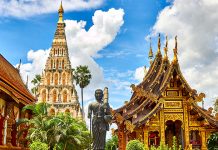Welcome Lydia, Abigail and Max!
Where are you from?
Guatemala and Belize. I was born in Guatemala and raised in both countries during some of the worst years of civil war in Guatemala. My dad was Guatemalan and my mom Belizean.
Where do you currently live and what countries have you lived in?
I currently live in Berkeley, California. I have lived in Guatemala City, Belize City and Caye Caulker, Belize, Miami, Mountain View, CA, Oakland, and Palo Alto, CA
How old are your children and where were they born? What is their cultural heritage?
My children are five (Max) and six (Abigail), and they were born in Berkeley, CA. I am Hispanic and their father is Russian Jewish.
What passports do you and your children hold?
I hold Belizean, Guatemalan and American passports. My children hold American passports.
In what languages do you speak to your children?
Spanish and English.
What languages do your children speak?
They speak Spanish and English with me and Russian with their dad.
How do you reinforce other languages beyond just the parents speaking it?
We read in Spanish, Russian and English; we try to do regular playdates with other Spanish- and Russian-speaking children; we are friends with our Spanish-speaking produce guys at the local supermarket; their school has many Spanish-immersion kids with whom they speak regularly, although Abigail and Max are not in any immersion program; we have adult friends who are learning Spanish from the kids, and like to read in Spanish for them or get help from kids for their (the adult’s) Spanish homework.
Did you ever have any concerns with your children’s language acquisition?
Never. I read a bit about bilingualism in young children while pregnant, and from my own experience, learning two or more languages at an early age gives anyone a tremendous advantage in life.
Do you have any advice for parents raising multilingual kids on what works and what doesn’t?
Keep trying no matter what, and take breaks if you feel like you need to. I have been dreaming and thinking in English for the past five years, after going through college and graduate school in English, so many times I have to be the more disciplined one remembering to practice Spanish with my kids. Eventually we all switch to Spanish and it all flows naturally, but we have many breaks in English when we just want to zone out and speak the mainstream language, especially because depending on the topic it may be easier to communicate in English some days. So don’t be too hard on yourselves, and just be consistent with your goal of raising multilingual children. Most importantly, HAVE FUN—they will thank you later for giving them this amazing gift that could open so many doors in the future, and help them learn more about their own multicultural heritage.
What does raising a little global citizen mean to you?
It means raising awareness even at an early age about the enormous diversity in our world, while also pointing out that we have so many commonalities and we are one people striving for similar ideals. Living in the Bay Area it is hard not to feel like a global citizen because our community is so diverse already. At family dinners we are usually surrounded by friends from all over the world, including Mexico, China, the Philippines, India, Japan, Vietnam, Guam, Russia, Ukraine, and all over Latin America.
Recently, when choosing an elementary school for my five-year-old we enrolled her in a public elementary school near home instead of a private French-immersion program, which was her dad’s first preference. One of the main considerations was that the public school system offered a significantly more diverse student body than the French school.
What religion are you? And how are you raising your children?
I was raised Catholic because I grew up part of my childhood in a former Spanish colony. I do not practice any religion since I left Guatemala. The children are learning about Judaism and about the Catholic faith, although we do not practice. I consider it simply part of their heritage that they should know something about the faith I grew up in, because in a way it is part of our culture.
What have been your greatest challenges as an intercultural family?
Negotiating the many compromises involved in parenthood is sometimes difficult because we are from such different backgrounds, and many times we disagreed about parenthood approaches to various issues. We try to keep in mind what is best for the children whenever we are making decisions about their upbringing. Many times the children themselves help us decide some of the important decisions. For example, last year, when deciding in which elementary school to enroll Abigail, she voiced her own preference for the local school because we could walk to school in the mornings and she could run in the grass! The private school is all concrete with limited open space for outdoor play.
What have been your greatest joys as an intercultural family?
Joking about the misunderstandings we sometimes have while switching between languages, and getting to know other multicultural families who share some of our challenges in helping our children make the most of their diverse heritage.


































What a great interview! What I especially loved is her advice on raising multilingual kids: to have fun, to keep trying no matter what, and to also take breaks. Her interview gives me hope and optimism especially on days when I feel like throwing in the towel (giving up!). Thank you!
Great interview! I also thought the idea of “taking breaks” was refreshing. There’s such an urgency to achieve fluency sometimes, we forget to relax. What a fascinating family!
I teach Spanish, my kids are fully bilingual!
We could be best friends 🙂 Our families are sooo a like.